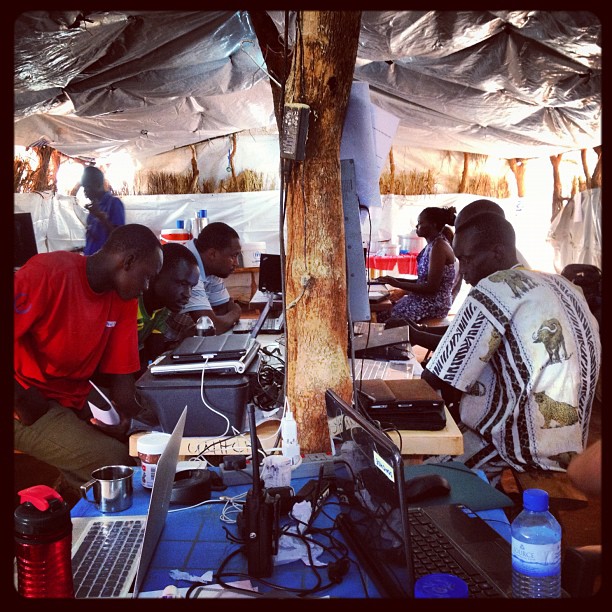South Sudan media calls for reflection on “international standards” in draft bills
November 11, 2012 (JUBA) – Various South Sudanese media outlets have called on the government to ensure that draft media bills reflect international standards, uphold good governance and spread system of accountability in all public and private institutions.

The media group also called for the provision of a “conducive atmosphere” in order to encourage effective participation in nation building.
The young nation has already been subject to international criticism with regards to press freedom. In July Reporters Without Borders published a report stating South Sudan “is not currently prey to concerted and systematic harassment of its media,” but that that “there has been a disturbing accumulation of incidents and isolated acts of repression or intimidation that end up undermining the climate in which journalists and media operate.”
Attending journalists, many of whom have repeatedly showed dissatisfaction with the absecence of media legislation, asserted that press is the main stand on which government communicates with the citizens on matters of national interest, including strategic development plans and governing policies but noted that the industry is vulnerable since “it is exposed to fierce attack by senior officials from the ruling regime,” according to Michael Koma, Secretary General of the UJoSS.
“Unlike other civil institutions, the media in South Sudan is under close surveillance. Under a system that wants to show absolute control and intention to shut up the society, free press is certainly seen as its competitor instead of being seen as partner in development,” said Koma.
“There are names and areas that we are not allowed to talk about in the newspapers. We live in a difficult reality and cannot even dream of a free press,” he added.
He cited numerous instances of the South Sudan’s security services, at media–security meetings, advising editors and senior reporters to avoid reporting on sensitive matters.
According to Korma members of the media had been “summoned many times by the security to their offices in Jebel.” He claimed this happened when 75 government officials were accused of embezzling US$4 billion by president Salva Kiir. They were instructed “never to report about it” according to Korma. He stated the same was the case more recently with “areas which are considered sensitive in the recent cooperation agreement [between South Sudan and Sudan] regarding the 14 mile area and four freedoms.”
The London-based freedom of information and expression organisation, Article 19, released a report in July analysing the draft media legislation. It notes that it “will not be independent from the government for a number of reasons. Firstly, its members would be appointed by the joint action of the Minister for Information and Broadcasting, the Council of Ministers, and the President, and can be removed by the President, on the recommendation of the Minister.”
Newspapers failing to tow the party line face indefinite closure according to participants of the meeting. The Destiny newspaper remains out of circulation since the publication of an article in 2011 discussing the marriage of president Salva Kiir’s daughter.
Some attendees argued that the government had acted without reference to its own laws. “There is no article in the current transitional constitution related to censorship nor is there new a law permitting security agents to forcefully close indefinitely a newspaper like what happened to Destiny,” said Hassan Juma, an independent journalist who writes for multiple media houses.
Economic factors were discussed as one of the issues facing the press, including the high cost of printing, buying paper and the lack of any state subsidies.
The Citizen newspaper, which is the only daily English newspaper in the country last week, announced it was suspending circulation because it was not able to get enough hard currency to purchase printing papers to sustain regular circulation.
Participants observed that sport and lifestyle publications have the highest circulation while political news and cultural publications are suffering from a lack of funding in the absence of advertising.
“There are no independent courts in this country. The judges you see here are all politicians. Courts do not investigate the alleged perpetrators of these crimes; they just ruled cases in their favours sometimes on hearsay without gathering sufficient evidence. I was almost arrested in Yei last year when I said this during a consultative meeting for legal counselors to which I was invited”, Samuel Tut, a senior member of the Association for Media Development in South Sudan (AMDISS) told the audience at the training.
Tut called on journalists to rally around a single motto without considering personal benefits: “free press,” explaining that there are individuals in the government who consider the press a threat and that these are the people using the security services to intimidate journalists and civil right activists.
“There are senior government officials using the security as a remote control to suppress the media. The unabated kidnapping of members of the civil society organisations and the continuous summoning and persistent denial of journalist to cover and report on controversial issues is itself an act indicative of intention by some government officials to control the media”, added Samson Legge another independent journalist from Central Equatoria. Legge said he has been repeatedly denied access to sensitive issues in the state.
However, Gwado Ador, director for training and research at the ministry of information and broadcasting denied the accusations that the government intends to control the media.
He said that the media must show responsibility in their reporting in order to avoid getting putting the government at loggerheads with the citizens. “Nobody in the government wants to control the media. It is the policy of the government to promote free press. So there is a need for responsible press, a media that informs the citizen of the government policies and development plans,” Ador told journalists.
(ST)
